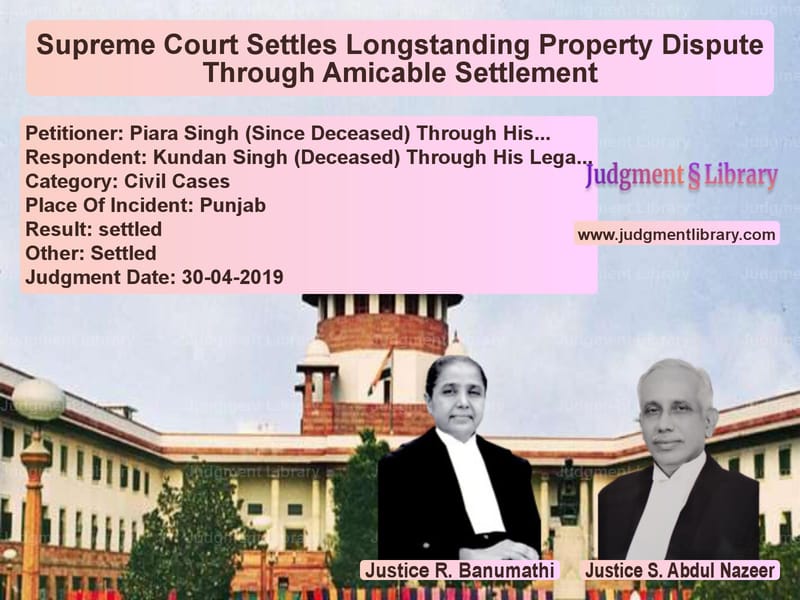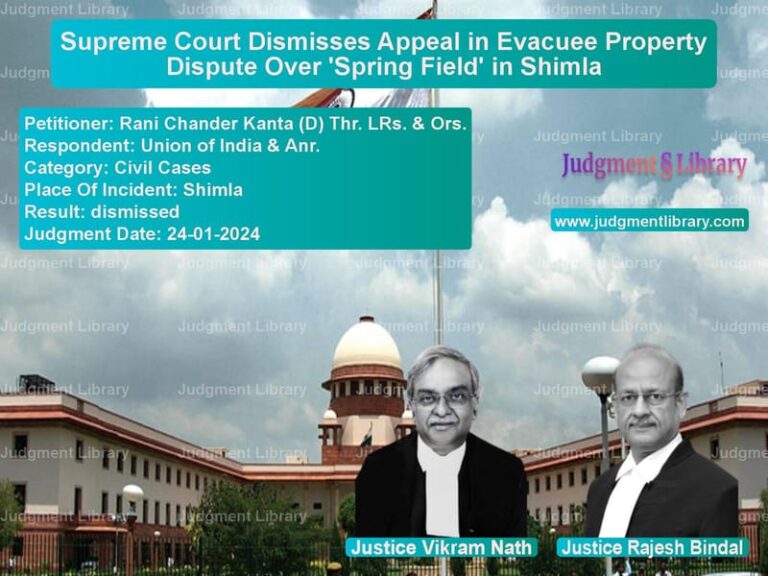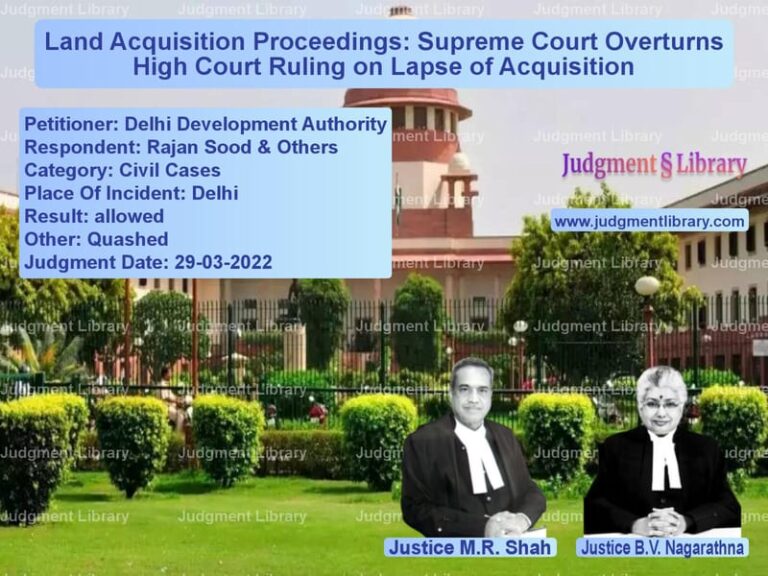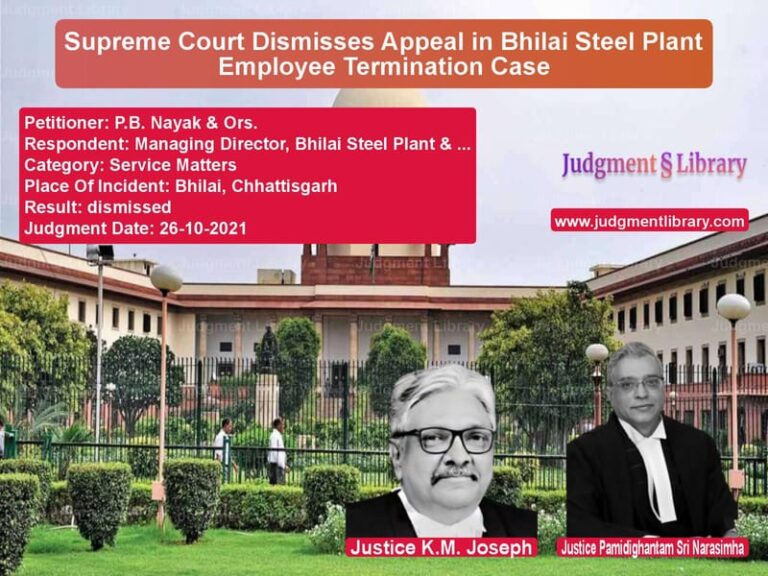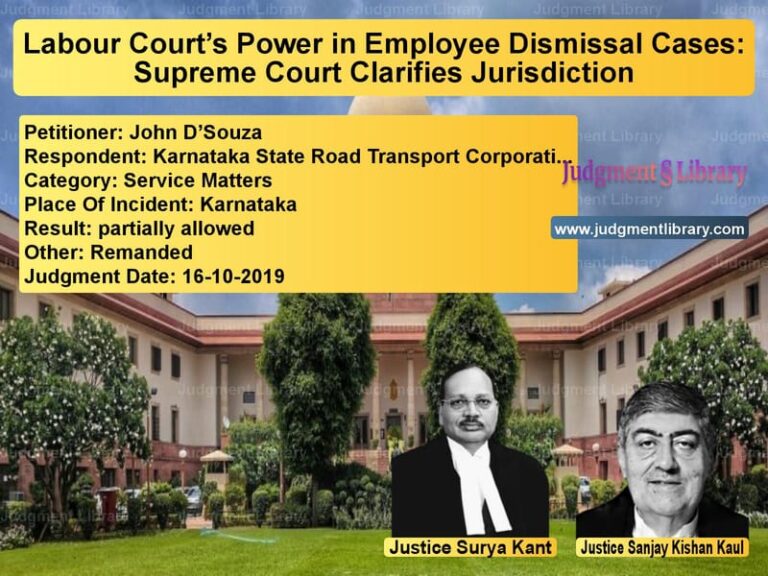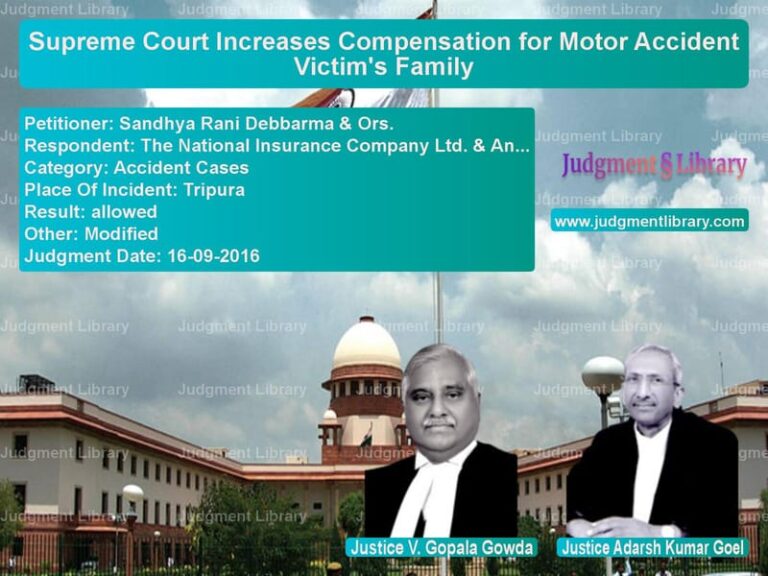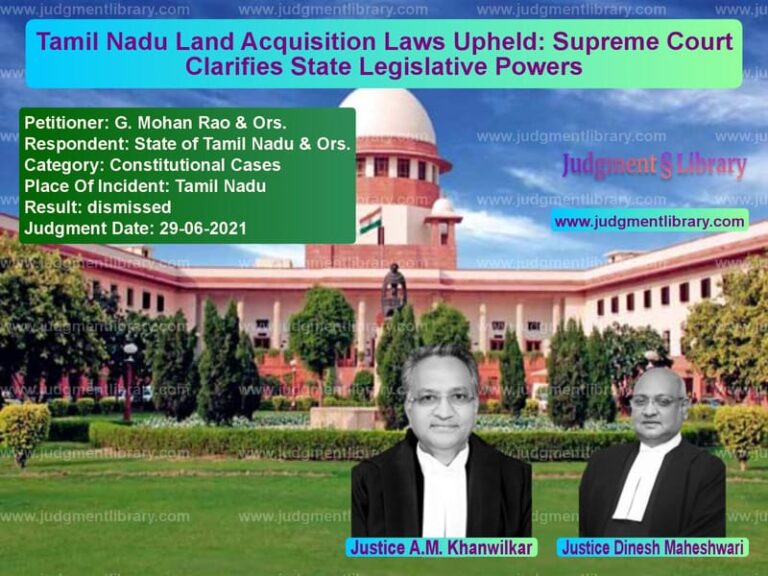Supreme Court Settles Longstanding Property Dispute Through Amicable Settlement
The Supreme Court of India, in its judgment dated April 30, 2019, finalized a series of property disputes that had been ongoing for decades. The case, Piara Singh (Since Deceased) Through His LRs. vs. Kundan Singh (Deceased) Through His Legal Heirs, was one among multiple appeals concerning land ownership and inheritance disputes in Punjab. The Supreme Court disposed of the appeals based on settlement agreements signed by the parties, bringing a peaceful resolution to the disputes.
Background of the Case
The legal battle between the families of Piara Singh, Ranjit Singh, and Pritam Kaur on one side and Kundan Singh’s legal heirs on the other side stemmed from conflicting claims over land ownership in Punjab. Multiple civil suits had been filed, leading to years of litigation in lower courts. These cases eventually reached the High Court of Punjab and Haryana, which passed judgments in 2014, prompting appeals before the Supreme Court.
The three primary cases were:
- Civil Appeal No. 4511 of 2019: Piara Singh’s legal heirs vs. Kundan Singh’s legal heirs
- Civil Appeal No. 4512 of 2019: Ranjit Singh and others vs. Kundan Singh’s legal heirs
- Civil Appeal No. 4513 of 2019: Pritam Kaur’s legal heirs vs. Kundan Singh’s legal heirs
While the legal proceedings were ongoing, both parties decided to amicably resolve their disputes through settlement agreements.
Settlement Between the Parties
Recognizing the prolonged nature of the litigation and the need for a peaceful resolution, the parties negotiated settlements to divide the disputed properties fairly. The settlement agreements were signed on January 15, 2019, and later reaffirmed on April 24, 2019. These agreements laid down specific terms for property distribution among the heirs, ensuring that all parties received a fair share.
The settlements were formally recorded in the following:
- IA No. 19436 of 2019 and IA No. 69863 of 2019: Piara Singh’s case
- IA No. 19441 of 2019 and IA No. 698693 of 2019: Ranjit Singh’s case
- IA No. 19444 of 2019 and IA No. 69872 of 2019: Pritam Kaur’s case
Arguments Presented Before the Supreme Court
- Both parties, through their respective legal representatives, confirmed the validity of the settlement agreements.
- The appellants stated that all disputes regarding ownership, inheritance, and possession had been settled amicably.
- The respondents accepted the terms of the settlement, ensuring that the matter would not be subject to future litigation.
- Since no legal questions remained for adjudication, both sides requested the Supreme Court to dispose of the appeals based on the settlement terms.
Supreme Court’s Observations
- The Court acknowledged the effort made by both parties to resolve their disputes outside of prolonged litigation.
- It noted that the settlement agreements had been voluntarily entered into and were legally binding.
- The Court emphasized the importance of alternative dispute resolution mechanisms to settle long-pending property disputes.
- The judgment stated, “In order to give quietus to the disputes and differences, the parties have amicably settled the matter. The appeal is disposed of in terms of the Settlement Deeds, which shall form part of this order.”
Final Judgment
- The Supreme Court disposed of all three appeals in accordance with the terms of the settlement agreements.
- It directed the Registry to draft the decrees as per the terms outlined in the settlement deeds.
- The parties were instructed to implement the settlement terms without any further legal challenges.
Legal Implications
- This judgment highlights the Supreme Court’s support for amicable settlements in civil disputes, particularly in property-related cases.
- It reinforces the effectiveness of alternative dispute resolution mechanisms in reducing the burden on courts.
- The ruling serves as a precedent for other litigants involved in long-standing property disputes, encouraging them to seek settlements rather than prolonged litigation.
Conclusion
The Supreme Court’s decision to settle these cases based on mutual agreements brings a much-needed resolution to a decades-old legal battle. The ruling emphasizes the importance of negotiation and mediation in property disputes, ensuring that justice is delivered efficiently and fairly. By endorsing settlements, the Court sets a positive precedent for parties in similar disputes, encouraging them to seek amicable solutions rather than engaging in prolonged litigation.
Petitioner Name: Piara Singh (Since Deceased) Through His LRs..Respondent Name: Kundan Singh (Deceased) Through His Legal Heirs.Judgment By: Justice R. Banumathi, Justice S. Abdul Nazeer.Place Of Incident: Punjab.Judgment Date: 30-04-2019.
Don’t miss out on the full details! Download the complete judgment in PDF format below and gain valuable insights instantly!
Download Judgment: Piara Singh (Since D vs Kundan Singh (Deceas Supreme Court of India Judgment Dated 30-04-2019.pdf
Direct Downlaod Judgment: Direct downlaod this Judgment
See all petitions in Property Disputes
See all petitions in Succession and Wills
See all petitions in Judgment by R. Banumathi
See all petitions in Judgment by S. Abdul Nazeer
See all petitions in settled
See all petitions in settled
See all petitions in supreme court of India judgments April 2019
See all petitions in 2019 judgments
See all posts in Civil Cases Category
See all allowed petitions in Civil Cases Category
See all Dismissed petitions in Civil Cases Category
See all partially allowed petitions in Civil Cases Category

